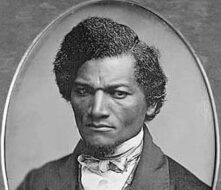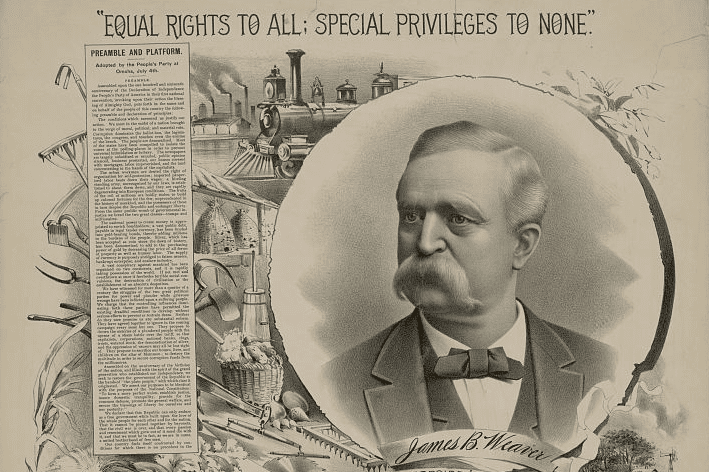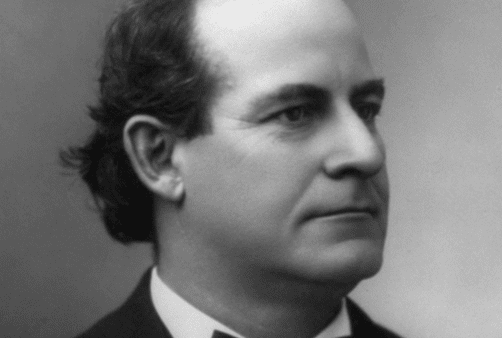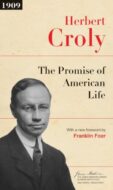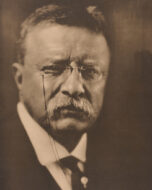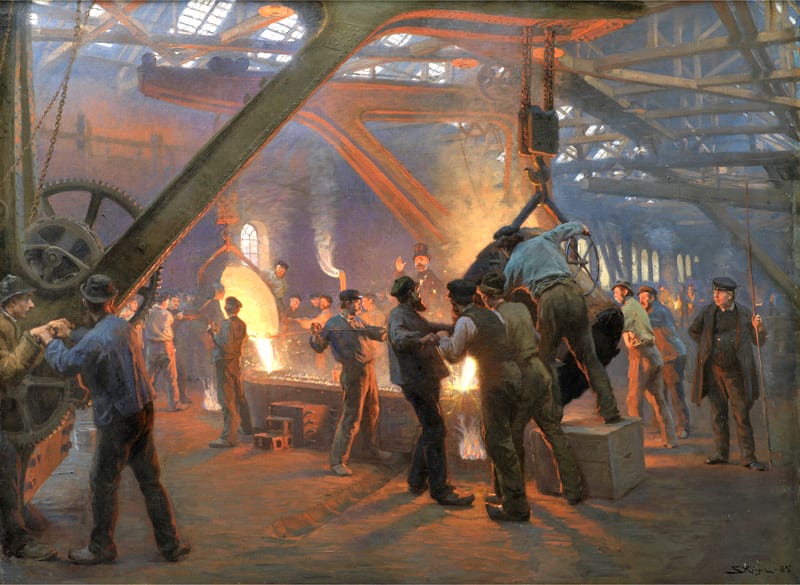
Introduction
The Populist Party, also known as the People’s Party, was formed in 1891 as an outgrowth of the Grange, the Farmers’ Alliance, the Greenback Party, and the populist movement more generally. Advocating the interests of farmers and the working classes, the party found particular support in the southern and western United States. The party fielded presidential candidate James B. Weaver (See Weaver) in the election of 1892 and garnered 8.5 percent of the vote, carrying Idaho, Kansas, Colorado, and Nevada.
The inaugural platform reprinted here was formally adopted at the party’s first national nominating convention in Omaha, Nebraska, on July 4, 1892. The platform and an expression of sentiments laid out the new party’s basic principles and policy stances, which included abandoning the gold standard and embracing free silver (the unlimited coinage of silver to increase the money supply; see Bryan), abolishing the national banking system, adopting the graduated income tax, land reform and public ownership of railroads, an eight-hour workday, initiative and referendum, the secret ballot, and the direct election of senators. After the demise of the Populist Party, many of these proposals were taken up by various elements of the progressive movement.
Source: The World Almanac (New York: 1893), 83–85, available online at the Hathi Trust Digital Library: https://babel.hathitrust.org/cgi/pt?id=iau.31858001408966&view=1up&seq=559.
Assembled upon the 116th anniversary of the Declaration of Independence, the People’s Party of America, in their first national convention, invoking upon their action the blessing of Almighty God, put forth in the name and on behalf of the people of this country, the following preamble and declaration of principles:
Preamble
The conditions which surround us best justify our cooperation; we meet in the midst of a nation brought to the verge of moral, political, and material ruin. Corruption dominates the ballot box, the legislatures, the Congress, and touches even the ermine of the bench.[1] The people are demoralized; most of the states have been compelled to isolate the voters at the polling places to prevent universal intimidation and bribery. The newspapers are largely subsidized or muzzled, public opinion silenced, business prostrated, homes covered with mortgages, labor impoverished, and the land concentrating in the hands of capitalists. The urban workmen are denied the right to organize for self-protection; imported pauperized labor beats down their wages, a hireling standing army, unrecognized by our laws, is established to shoot them down, and they are rapidly degenerating into European conditions. The fruits of the toil of millions are boldly stolen to build up colossal fortunes for a few, unprecedented in the history of mankind; and the possessors of those, in turn, despise the Republic and endanger liberty. From the same prolific womb of governmental injustice, we breed the two great classes—tramps and millionaires.
The national power to create money is appropriated to enrich bondholders; a vast public debt payable in legal tender currency has been funded into gold-bearing bonds, thereby adding millions to the burdens of the people.
Silver, which has been accepted as coin since the dawn of history, has been demonetized to add to the purchasing power of gold by decreasing the value of all forms of property as well as human labor, and the supply of currency is purposely abridged to fatten usurers, bankrupt enterprise, and enslave industry. A vast conspiracy against mankind has been organized on two continents, and it is rapidly taking possession of the world. If not met and overthrown at once it forebodes terrible social convulsions, the destruction of civilization, or the establishment of an absolute despotism.
We have witnessed for more than a quarter of a century the struggles of the two great political parties for power and plunder, while grievous wrongs have been inflicted upon the suffering people. We charge that the controlling influences dominating both these parties have permitted the existing dreadful conditions to develop without serious effort to prevent or restrain them. Neither do they now promise us any substantial reform. They have agreed together to ignore, in the coming campaign, every issue but one. They propose to drown the outcries of a plundered people with the uproar of a sham battle over the tariff, so that capitalists, corporations, national banks, rings, trusts, watered stock, the demonetization of silver, and the oppressions of the usurers may all be lost sight of.[2] They propose to sacrifice our homes, lives, and children on the altar of mammon; to destroy the multitude in order to secure corruption funds from the millionaires.[3]
Assembled on the anniversary of the birthday of the nation, and filled with the spirit of the grand general and chief who established our independence, we seek to restore the government of the Republic to the hands of “the plain people,” with which class it originated. We assert our purposes to be identical with the purposes of the national Constitution; to form a more perfect union and establish justice, insure domestic tranquility, provide for the common defense, promote the general welfare, and secure the blessings of liberty for ourselves and our posterity.
We declare that this Republic can only endure as a free government while built upon the love of the whole people for each other and for the nation; that it cannot be pinned together by bayonets; that the civil war is over, and that every passion and resentment which grew out of it must die with it, and that we must be in fact, as we are in name, one united brotherhood of freemen.
Our country finds itself confronted by conditions for which there is no precedent in the history of the world; our annual agricultural productions amount to billions of dollars in value, which must, within a few weeks or months, be exchanged for billions of dollars’ worth of commodities consumed in their production; the existing currency supply is wholly inadequate to make this exchange; the results are falling prices, the formation of combines and rings, the impoverishment of the producing class. We pledge ourselves that if given power we will labor to correct these evils by wise and reasonable legislation, in accordance with the terms of our platform.
We believe that the power of government—in other words, of the people—should be expanded (as in the case of the postal service) as rapidly and as far as the good sense of an intelligent people and the teachings of experience shall justify, to the end that oppression, injustice, and poverty shall eventually cease in the land.
While our sympathies as a party of reform are naturally upon the side of every proposition which will tend to make men intelligent, virtuous, and temperate, we nevertheless regard these questions, important as they are, as secondary to the great issues now pressing for solution, and upon which not only our individual prosperity but the very existence of free institutions depend; and we ask all men to first help us to determine whether we are to have a republic to administer before we differ as to the conditions upon which it is to be administered, believing that the forces of reform this day organized will never cease to move forward until every wrong is remedied and equal rights and equal privileges securely established for all the men and women of this country.
Platform
We declare, therefore,
First—That the union of the labor forces of the United States this day consummated shall be permanent and perpetual; may its spirit enter into all hearts for the salvation of the Republic and the uplifting of mankind.
Second—Wealth belongs to him who creates it, and every dollar taken from industry without an equivalent is robbery. “If any will not work, neither shall he eat.”[4] The interests of rural and civic labor are the same; their enemies are identical.
Third—We believe that the time has come when the railroad corporations will either own the people or the people must own the railroads, and should the government enter upon the work of owning and managing all railroads, we should favor an amendment to the Constitution by which all persons engaged in the government service shall be placed under a civil-service regulation of the most rigid character, so as to prevent the increase of the power of the national administration by the use of such additional government employees.
Finance—We demand a national currency, safe, sound, and flexible, issued by the general government only, a full legal tender for all debts, public and private, and that without the use of banking corporations, a just, equitable, and efficient means of distribution direct to the people, at a tax not to exceed 2 percent per annum, to be provided as set forth in the sub-treasury plan of the Farmers’ Alliance, or a better system; also by payments in discharge of its obligations for public improvements.
- We demand free and unlimited coinage of silver and gold at the present legal ratio of 16 to 1.
- We demand that the amount of circulating medium be speedily increased to not less than $50 per capita.
- We demand a graduated income tax.
- We believe that the money of the country should be kept as much as possible in the hands of the people, and hence we demand that all state and national revenues shall be limited to the necessary expenses of the government, economically and honestly administered.
- We demand that postal savings banks be established by the government for the safe deposit of the earnings of the people and to facilitate exchange.
Transportation—Transportation being a means of exchange and a public necessity, the government should own and operate the railroads in the interest of the people. The telegraph, telephone, like the post-office system, being a necessity for the transmission of news, should be owned and operated by the government in the interest of the people.
Land—The land, including all the natural sources of wealth, is the heritage of the people, and should not be monopolized for speculative purposes, and alien ownership of land should be prohibited. All land now held by railroads and other corporations in excess of their actual needs, and all lands now owned by aliens should be reclaimed by the government and held for actual settlers only.
Expression of Sentiments
Your Committee on Platform and Resolutions beg leave unanimously to report the following: Whereas, other questions have been presented for our consideration, we hereby submit the following, not as a part of the Platform of the People’s Party, but as resolutions expressive of the sentiment of this Convention.
- RESOLVED, That we demand a free ballot and a fair count in all elections and pledge ourselves to secure it to every legal voter without federal intervention, through the adoption by the states of the unperverted Australian or secret ballot system.
- RESOLVED, That the revenue derived from a graduated income tax should be applied to the reduction of the burden of taxation now levied upon the domestic industries of this country.
- RESOLVED, That we pledge our support to fair and liberal pensions to ex-Union soldiers and sailors.
- RESOLVED, That we condemn the fallacy of protecting American labor under the present system, which opens our ports to the pauper and criminal classes of the world and crowds out our wage-earners; and we denounce the present ineffective laws against contract labor, and demand the further restriction of undesirable emigration.
- RESOLVED, That we cordially sympathize with the efforts of organized workingmen to shorten the hours of labor, and demand a rigid enforcement of the existing eight-hour law on government work, and ask that a penalty clause be added to the said law.
- RESOLVED, That we regard the maintenance of a large standing army of mercenaries, known as the Pinkerton system, as a menace to our liberties, and we demand its abolition.[5] . . .
- RESOLVED, That we commend to the favorable consideration of the people and the reform press the legislative system known as the initiative and referendum.
- RESOLVED, That we favor a constitutional provision limiting the office of president and vice president to one term, and providing for the election of senators of the United States by a direct vote of the people.
- RESOLVED, That we oppose any subsidy or national aid to any private corporation for any purpose.
- RESOLVED, That this convention sympathizes with the Knights of Labor and their righteous contest with the tyrannical combine of clothing manufacturers of Rochester, and declare it to be a duty of all who hate tyranny and oppression to refuse to purchase the goods made by the said manufacturers, or to patronize any merchants who sell such goods.[6]
- 1. “Ermine of the bench” refers to the fur, or ermine, that adorned the robes of judges or other officials. The phrase suggests that the judges thought themselves to be aristocrats.
- 2. “Watered stock” refers to stocks and bonds with an artificially inflated value, often associated with securities fraud. The term itself originates from the practice of bloating livestock with water before their weigh-in for sale.
- 3. “Mammon” refers to wealth as an object of worship.
- 4. 2 Thessalonians 3:10.
- 5. The Pinkerton National Detective Agency is a private security company. Some businesses hired Pinkerton employees as guards and to infiltrate unions, frustrate labor-organizing efforts, break strikes, etc.
- 6. The Noble and Holy Order of the Knights of Labor was a nineteenth-century labor federation. Its popularity declined in the late 1890s, and many members were absorbed into the American Federation of Labor (AFL).

Conversation-based seminars for collegial PD, one-day and multi-day seminars, graduate credit seminars (MA degree), online and in-person.


















